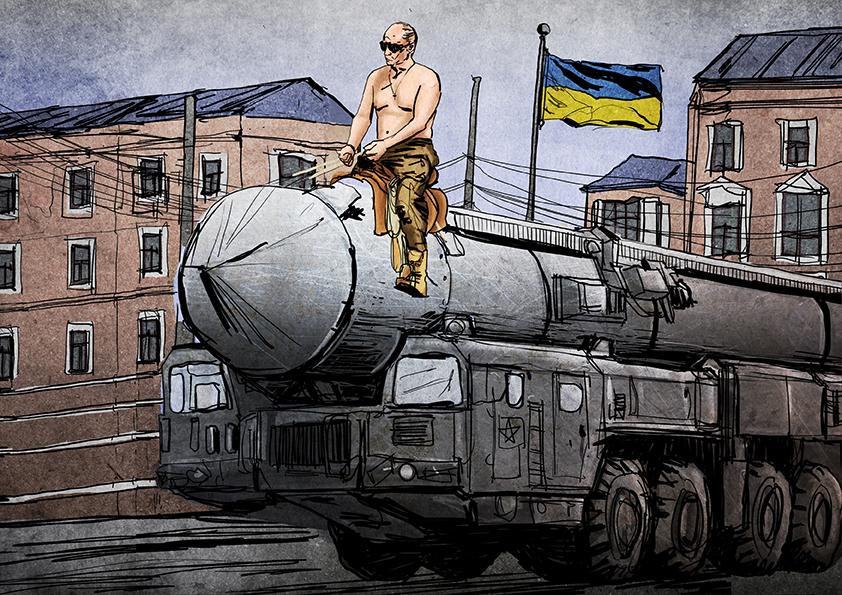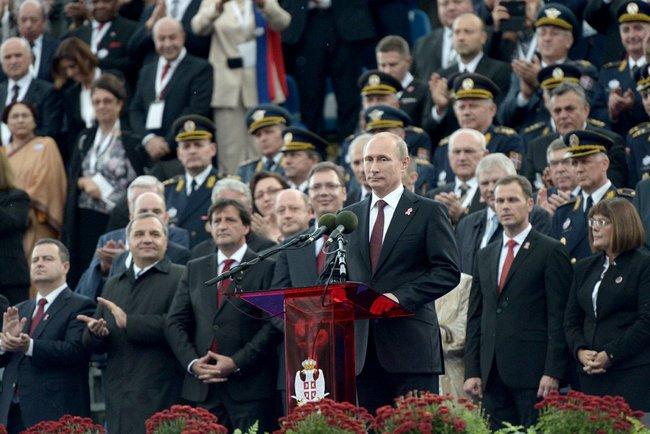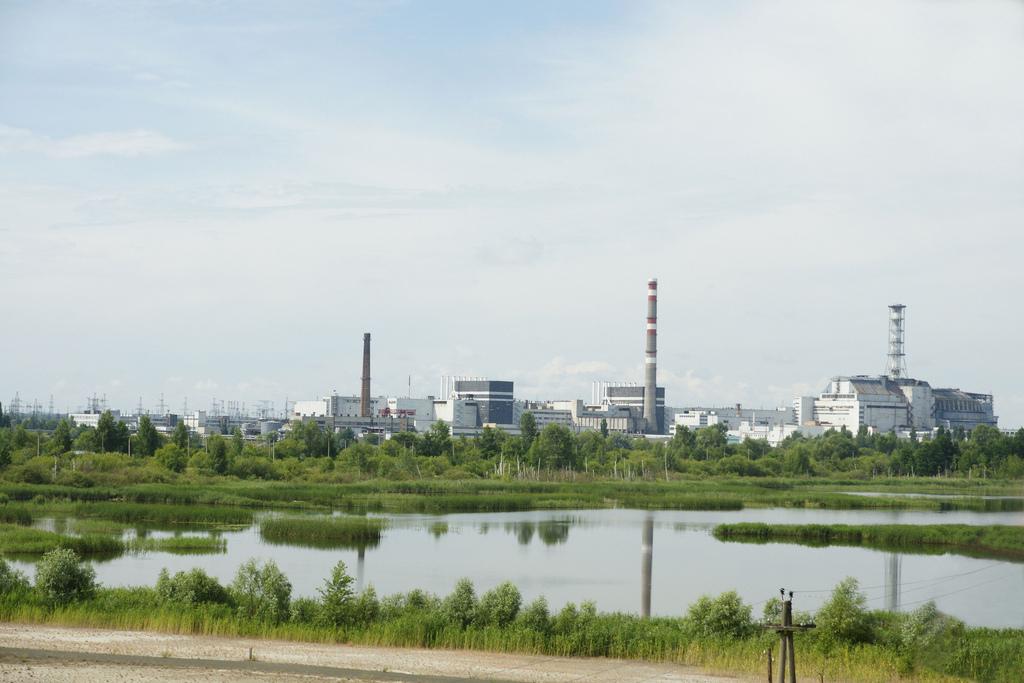Rising tensions in Eastern Europe: are we heading back to a Cold War?

On June 16th, 2015,
President of the Russian Federation Vladimir Putin announced a plan to add “forty new intercontinental ballistic missiles capable of overcoming any, even the most technically advanced, missile defense systems”. This statement about intercontinental ballistic missiles, or ICBMs, came during the opening ceremony of the International Military-Technical Forum “Army-2015,” an event that showcased Russia’s “newest cutting edge weapons and military equipment”. The goal of the forum was to bring together military manufacturers and those who use military technology in Russia and abroad.
“Army-2015” took place in Kubinka, a town about 39 miles west of Moscow. Kubinka’s history is very much intertwined with the forefront of Russian military innovation. The region was used in the 1940s as proving grounds for new Soviet tanks, and is now home to a tank museum, MiG MAPO (a military aircraft manufacturer), and the Kubinka air base.
... both the United States and Russia accuse each other of violating the Treaty on Intermediate-Range Nuclear Forces (INF) and the Treaty on the Non-Proliferation of Nuclear Weapons (NPT).
While the reason for President Putin’s announcement is uncertain, escalation of events in Ukraine, in conjunction with U.S. plans to station tanks and heavy weapons in NATO states bordering Russia, certainly played a role. Even prior to the Ukraine Crisis and NATO’s plans to station heavy equipment in Eastern Europe, military agreements and cooperation between the US and Russia have been unsteady. Russia has been troubled by what it sees as “the one-sided exit of the US from the ABM Treaty,” and how the “expansion of NATO into the east practically destroyed the Treaty on Conventional Armed Forces in Europe”. Finally, both the United States and Russia accuse each other of violating the Treaty on Intermediate-Range Nuclear Forces (INF) and the Treaty on the Non-Proliferation of Nuclear Weapons (NPT).

All of these frustrations seem to have pushed Russia, or rather, Putin’s tongue, to act. Russian Deputy Minister of Defense Anatoly Antonov tentatively concurred: “I believe the statement [of Putin] must be looked at together with other similar statements”. He added that “reports started to turn up about certain [American] missiles put in a certain location and about certain ammunition depots in Eastern European countries and the Baltic. It looks like our colleagues from NATO member states are pushing us into an arms race”.
The US and its allies have reacted strongly to Putin’s words. General Secretary of NATO Jens Stoltenberg stated that Russia’s unwarranted nuclear “saber-rattling" is “destabilizing and dangerous”. Philip Breedlove, who serves as the Supreme Allied Commander Europe (SACEUR) of NATO, stated that Russia’s plans concerning nuclear rearmament are “unacceptable for a responsible nuclear power”. Secretary of State John Kerry also expressed alarm, noting that “nobody should hear that kind of an announcement from the leader of a powerful country and not be concerned about the implications”.
Additionally, since Putin’s statement at “Army-2015”, the U.S. Secretary of Defense Ashton Carter stated that the U.S. and NATO will move forward using a "strong but balanced approach" in dealing with Moscow.
Interestingly, Putin’s announcement of forty new ICBMs shouldn’t come as a surprise.
In 2012, Putin — then Prime Minister of Russia — announced that “the military would receive more than 400 advanced ground and sea-based intercontinental ballistic missiles over the coming decade, or an average of forty missiles per year”. Thus, the number announced at “Army-2015” has been known for three years.

Moreover, six months prior to the recent military forum in Kubinka, Putin announced intentions to add fifty intercontinental ballistic missiles to its Strategic Rocket Force’s arsenal in 2015, meaning that the forty ICBMs announced in June is, in fact, a reduced number. Yet, there was less alarm then than now.
The media hype surrounding Putin’s June 16 statement becomes even more disproportionate when considering that these forty ICBMs will not cause a net increase in the Russian Federation’s nuclear stockpile. Russia is currently working to dismantle their retired but still-intact rockets (of which it has an estimated 3,500), so the forty additional ICBMs are “hi-tech replacements, not additions to Russia's nuclear arsenal”.
Indeed, the U.S. and NATO may not even need to worry at all. At least one senior Russian military official has publicly suggested that these plans to revitalize the military are beyond the means of the Kremlin’s pocketbook.
All the same, Putin’s statement could still merit worry. The fanfare and rhetoric of his announcement at “Army-2015” certainly had a tinge of militarism; such a statement, especially when taken out of context, justifiably contributes to international fear over a second arms race between Russia and the United States. Given this state of affairs, it is important to look beyond bombastic public statements for a clearer perspective on this divisive, grave, and dangerous issue.
Bibliography:
Russian entries were translated with the generous assistance and guidance of Dr. Anna Dvigubski of Barnard College, Columbia University.
Gady, Franz-Stefan. “Russia to Add 40 New ICBMs: Should the West Be Worried?” The Diplomat 17 Jun. 2015. Web. 13 Jul. 2015.
Garamone, Jim. “Carter Arrives in Europe to Discuss Russia, Southern Threats.” U.S. Department of Defense. Web. 15 Jul. 2015.
“Глава Пентагона: США в отношениях с РФ намерены вести себя жестко, но сбалансированно. [Head of the Pentagon: The US, in relations with Russia, intends to adhere to a strong, but balanced approach].” ТАСС 22 Jun. 2015. Web. 16 Jul. 2015.
*read the K1 translation from original Russian to English here.
MacFarquhar, Neil. “As Vladimir Putin Talks More Missiles and Might, Cost Tells Another Story.” The New York Times 16 Jun. 2015. Web 14 Jul. 2015.
“Путин переполошил Запад ракетами: С договорами в военной сфере все меньше считаются все стороны. [Putin alarmed the West with missiles: All sides are not being considered as much in military agreements].” Независимая Газета 22 Jun. 2015. Web. 16 Jul. 2015.
*read the K1 translation from original Russian to English here.
“Putin: Russia to boost nuclear arsenal with 40 missiles.” The BBC News 16 Jun. 2015. Web. 14 Jul. 2015.
“Putin: 40+ ICBMs targeted for 2015 nuclear force boost.” RT News 16 Jun. 2015. Web. 15 Jul. 2015.
Tsvetkova, Maria. “Putin says Russia beefing up nuclear arsenal, NATO denounces ‘saber-rattling’.” Reuters 16 Jun. 2015. Web. 14 Jul. 2015.
“Unprecedented Army-2015 military expo kicks off near Moscow (VIDEO).” RT News 16 Jun. 2015. Web. 15 Jul. 2015.
